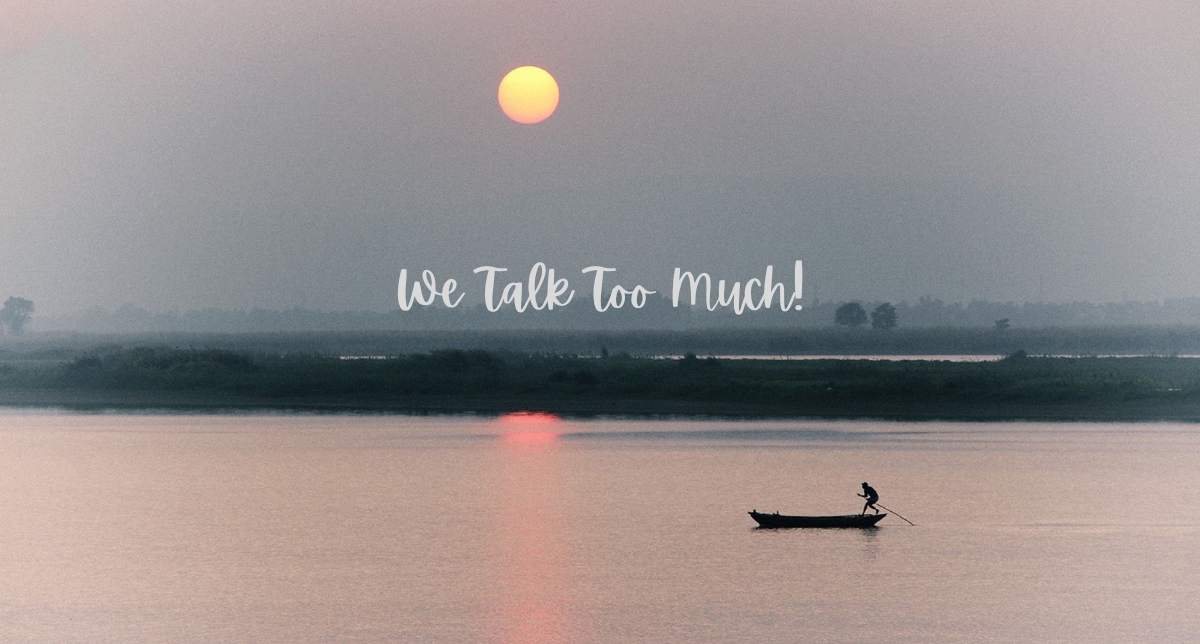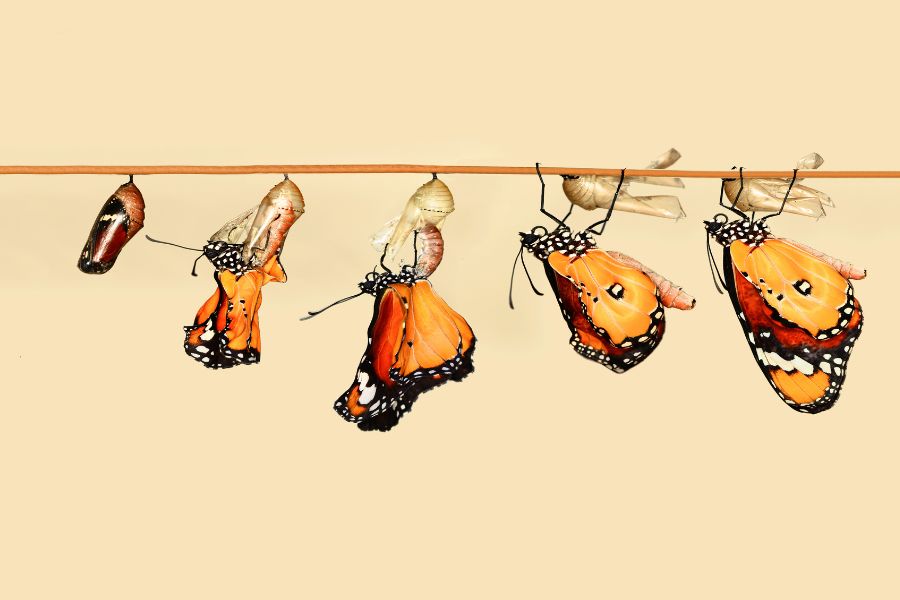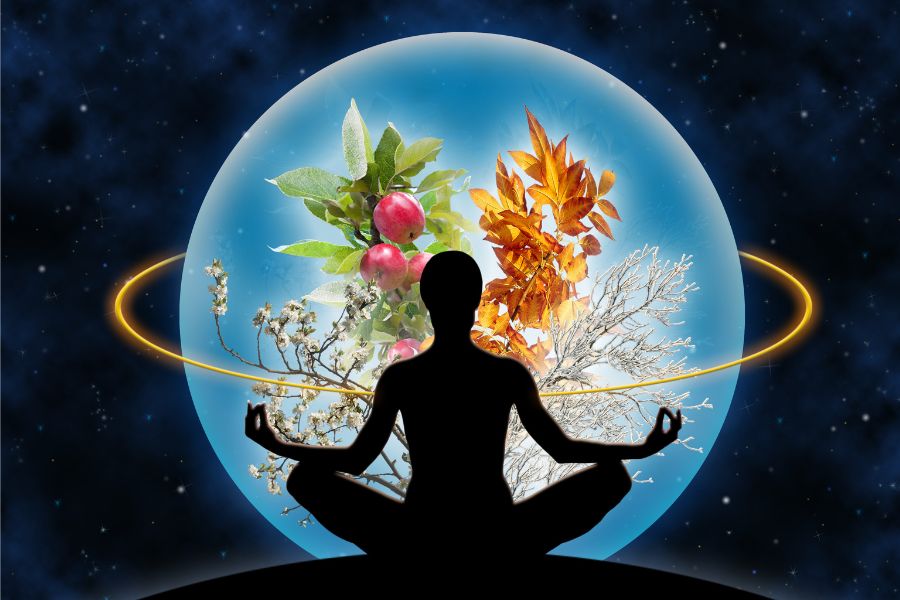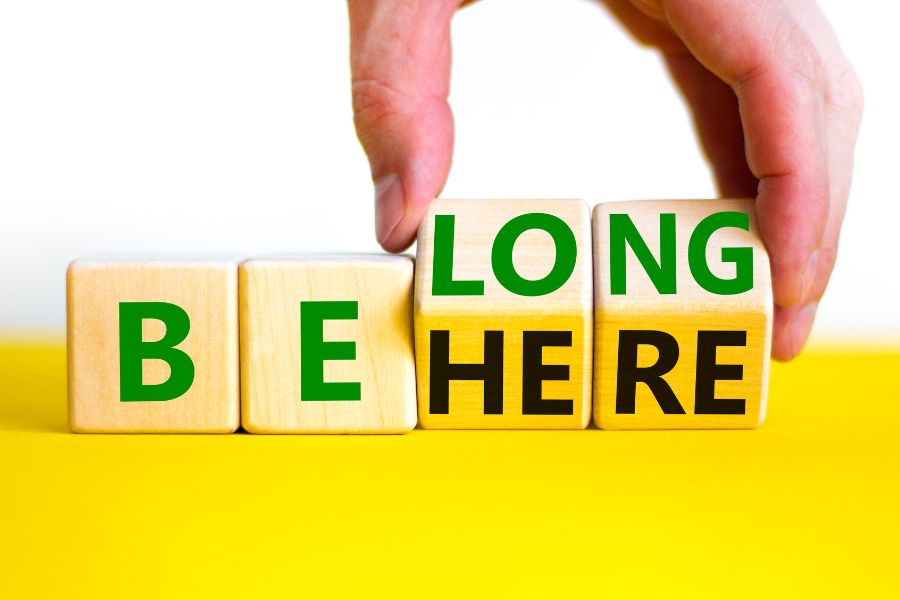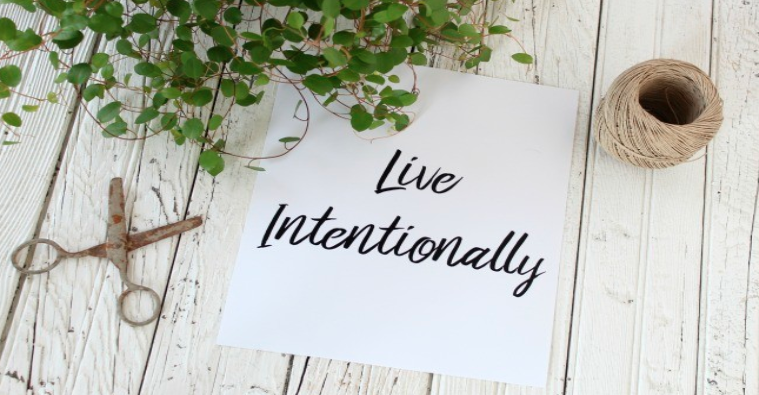— and it’s costing us everything that truly matters.
We talk too much. Not just with our mouths — though that alone is loud enough. We talk too much in the mind. Every time a thought arises, it sets off a chain: one spark, and suddenly you’re caught in a loop — thought, evaluation, reaction, and another thought. Whether you act or not, it’s still action. Whether you speak or stay silent, there’s still a dialogue running inside. It never really stops. We are constantly thinking, doing, observing, adjusting, chasing, pausing — but never truly still. It’s like living in a hall of mirrors: endless reflections of who we think we are, what we could have said, what we should have done, what might happen next. The mind’s voice doesn’t know how to rest. And neither do we.
The Hidden Cost of Thought
Every time you think, there’s a cost. Thought isn’t free — it pulls from somewhere. You pay with energy: mental, emotional, physical, subtle, and spiritual. We have five energy bodies (the Panchkoshas), five inner companions walking this life with us. And each time you entertain unnecessary thoughts, you drain one or more of them. A single unprocessed emotion triggers a leak. A simple over-analysis of a message or situation — another leak. Before long, you’re dry. Exhausted. Caught in the same loops you thought you were escaping. And you wonder why rest doesn’t feel like rest anymore.
We glorify critical thinking. We wear overthinking like a badge of intelligence. But most of our thoughts aren’t critical — they’re compulsive. They’re leftovers. Noise. Recycled stories we picked up but never questioned. And worst of all, they often run on a single track — shaped by our own narrow perspective, or maybe two or three others we’ve borrowed. It’s not the truth. It’s not full. And it’s certainly not peace.
Too Many Conversations That Never Happened
Over the past decade, I realized how much energy I was bleeding — not through action, but through internal rehearsals. Conversations I was never going to have, arguments that would never happen, imaginary responses to scenarios that didn’t even exist. These mental dialogues seemed harmless, even productive at times, but they quietly stole energy and anchored me to a false version of reality.
We don’t just talk too much — we process too much. And in that noise, we lose access to the real voice. The one that doesn’t speak in language. The one beyond the fear of being misunderstood, impolite, or judged. That voice is raw, true, and unbiased. We all admire it in others — clarity, presence, directness — but words often fail to carry it. That voice comes through only in silence.
The Practice of Saying Less
I began saying less — physically and deliberately. I chose stillness in speech and committed to speaking only when something real needed to be said. At first, it was difficult. When you stop telling your stories to the world, those stories start echoing inside. They want out. They want validation. They demand space. But space isn’t always meant for sound. And what I found was this: when you stop speaking, the noise inside you gets louder — but only for a while. Then something begins to shift. The storm settles. What remains is clarity — not born from explanation, but from emptiness finally being allowed to breathe.
The deeper work is drawing the line between what truly needs to be shared — for healing, connection, or creation — and what arises from the habitual mental urge to say something. Not every silence is a void. Not every thought needs a voice.
The Overuse of Language
We’ve over-glorified one of the most sacred tools given to human beings: language. What was meant to uplift and connect is now mostly used to argue, posture, and seek validation. We confuse saying more with knowing more. We’re drowning in opinions, scripted authenticity, and rehearsed expressions, forgetting that stillness is also communication — and often, a more powerful one.
Yes, language is beautiful and necessary. But like all tools of power, it must be used with precision. Before a word even becomes sound, it has already formed in the mind. The urge to speak arises, and with it begins the chain: thought, expression, reaction, judgment, and another round of thought. If you’re not paying attention, this becomes your entire day — narrating, justifying, performing — and you’re left wondering why you feel scattered, misunderstood, or empty.
The Real Practice
The real practice is not just choosing your words wisely — it’s watching for the moment before the words rise. Ask yourself: Is this necessary? Is it true? Is it coming from clarity or from a craving to be seen or understood? If not, let it burn in silence. Not every thought deserves to be spoken. Not every silence needs to be filled.
Seeing with the Eyes of the Mind
In silence, your perception sharpens. You begin to see not just with your physical eyes, but with a deeper intelligence. You hear differently too — not with your ears, but with attention. A quiet kind of knowing emerges, a kind that doesn’t require evidence or argument.
And from that still place, everything begins to shift. You start noticing which thoughts are actually yours and which aren’t. You begin to sense that some emotions were never even born inside you — they were absorbed, inherited, or triggered by noise outside. You no longer waste energy trying to fix the chaos — you let it dissolve. And in that release, you feel lighter.
Silence Is Not Absence — It’s Access
Most people fear silence because they mistake it for emptiness. But silence is not empty. It is full — full of intelligence, clarity, and original power. It is the womb of all peace. The foundation of strength. When we stop reacting, the body resets, the emotions settle, and the mind returns to its rightful place — not as master, but as servant to awareness.
And this is where something beautiful begins. We move from chasing to returning. From doing to being. From interpreting to knowing.
Burning What You’re Not
This path isn’t about becoming someone new. It’s about burning what you’re not. Just like fat burns to reveal the muscle beneath, silence burns through the noise, false identities, and spiritual posturing. What remains is lean. Pure. Real.
A being that no longer leaks energy across five layers of life — but channels it. Directs it. Becomes one with it.
This isn’t a process of addition — it’s a sacred subtraction.
The Fear of Silence
Silence can be intimidating — even frightening — especially for those meeting themselves for the first time through the true eye of the mind. In that stillness, the chaos and hollowness we’ve avoided begin to surface. But when met with compassion rather than avoidance, something begins to shift. The stillness becomes less like a void and more like a doorway.
We’ve over-glorified verbal communication as the highest form of human intelligence. But the deepest connections in life happen without words. Cross-species communication, a dog sensing his human’s sadness, a bird returning to its mate, or a single glance between a mother and her non-verbal child — all of these leap across language and say more than words ever could.
When communication begins from within, when we are truly connected to ourselves, we no longer need to explain everything. What remains is presence. And presence — unlike speech — cannot be misunderstood.
Start Here: Five Sacred Minutes
This isn’t a call to become a monk. It’s a reminder that stillness is your birthright.
Start with five minutes. Complete silence. No phone. No talking. No stimulation. Just you — as you are. Let your body relax. Let your thoughts arise — but don’t follow them. Just observe.
Just imagine — how many relationships could have been saved, how much human suffering could have been softened, how many problems resolved — if only we had learned to sit in silence first. Not silence as withdrawal, but silence as wisdom. A quiet that listens before it speaks, sees before it judges, and understands before it reacts. Inner silence isn’t just personal healing — it’s collective medicine.
There is a voice beneath all the noise. It doesn’t use language. But it always tells the truth. And it’s been waiting for you to return.

